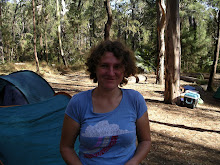I started with a short presentation explaining part of the learning framework I hope to use in the my lesson and unit planning. Understanding this will help you see how smoothly ICT and digital technologies can be integrated into the classroom. Not only this, but did this engage you and motivate you to read the blog? Did it appeal to you more because you are an active learner or are you a visual learner? ICTs can cover a huge variety of learning styles and engage the learner, grab their attention at the start of a lesson!
The move towards learner-centred learning from teacher-centred, providing clear outcomes and allowing for different learning styles and abilities embraces a number of free, widely available web-based ICT just to start.
Google offers a number of 'communicate, show and share' products that can be used to produce a range of Project Based Learning.
- E-journals using Blogger that can be peer reviewed, not just by those in school, but anyone in the world. Clay Burell (a world without textbooks) has excellent examples of this, but also advises to keep the project within a realistic size. Managing reviews from an international audience may take forever. This hands control to the learner and allows formative peer assessment to such an extent that a student may start on a low level and improve with constant peer review. Presenting work on-line in public view may improve intrinsic motivation and is shown in many examples ranging from publishing stories to videos and more.
- Docs allow students to create and share online documents, spreadsheets and presentations, this may improve their presentation skills, spelling, grammar, maths and allows them to start at their own level and use tools that appeal to their sense of learning.
- E-mails and forums allow communicative and group work, ideas and problems can be discussed and referred to even at home.
Web-browsing software opens the door to endless resources (DoL5-Self-regulated Thinking) and social bookmarking provides on-line organisation.
Subject specific software, whether on-line or owned by the school allow the students to apply their skills to real life situations and experience real life applications. This ranges from Prep to old age.
There are WIKIs (I will get to those in a later blog!) or podcast allowing students to learn on their ipods when they are riding their bike! The students can make their own podcast, present their work on video, the list is expanding yearly.
I love the idea of virtual reality and gaming. Yes, gaming, no..I hear you cry! Online games can often have an embedded framework that allows progress using problem solving skills, communication and teamwork with other gamers. Sometimes up to huge numbers with very complicated tasks. Of course assessment is instant, you either continue or game over. I'm not saying school should be six hours on-line gaming, I'm just making a point.
Virtual reality worlds have been used in adult training for a while, think of flight simulators to start. Now customer service courses can put themselves in a virtual world programmed with virtual customers who can be as demanding as the real ones. Once you have experienced the situation (problem) worked out the correct solution (solving) you have hands on practical 'real life' experience. So why not in the classroom. Even primary students can learn networking skills and cyber safety in virtual worlds!
I just have to end by mentioning one thing - Nintendo DS - can these be used in the classroom, well yes they can. I cannot embed this video due to copyright, but you can go and watch it at www.teachers.tv - is the list endless? I make this technology sound attractive, but it is worth considering the issues like cyber-bullying, funding and teacher's professional development that challenge the integration and development (not to mention parents) - I suspect another Blog!
Cheers
Johanna

No comments:
Post a Comment